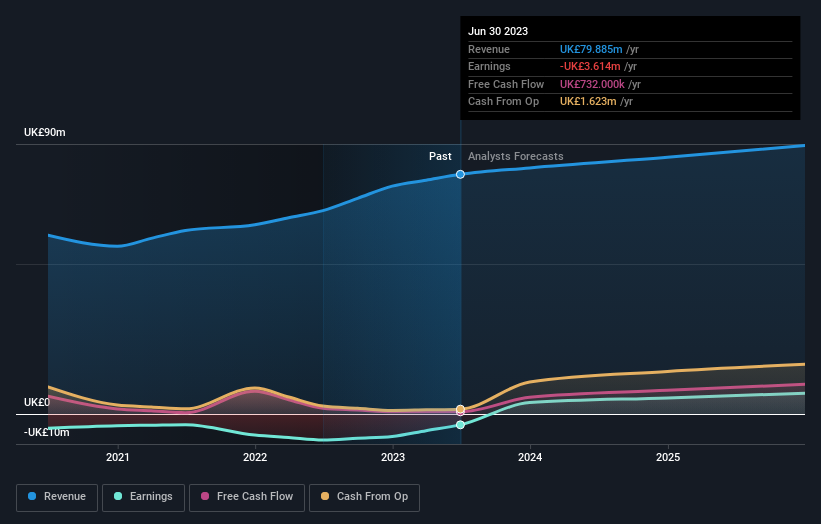- United Kingdom
- /
- Media
- /
- AIM:EBQ
Investors ignore increasing losses at Ebiquity (LON:EBQ) as stock jumps 19% this past week

By buying an index fund, you can roughly match the market return with ease. But if you pick the right individual stocks, you could make more than that. Just take a look at Ebiquity plc (LON:EBQ), which is up 41%, over three years, soundly beating the market return of 2.1% (not including dividends).
Since the stock has added UK£7.0m to its market cap in the past week alone, let's see if underlying performance has been driving long-term returns.
Check out our latest analysis for Ebiquity
Given that Ebiquity didn't make a profit in the last twelve months, we'll focus on revenue growth to form a quick view of its business development. Shareholders of unprofitable companies usually expect strong revenue growth. That's because it's hard to be confident a company will be sustainable if revenue growth is negligible, and it never makes a profit.
Over the last three years Ebiquity has grown its revenue at 12% annually. That's pretty nice growth. While the share price has done well, compounding at 12% yearly, over three years, that move doesn't seem over the top. If that's the case, then it could be well worth while to research the growth trajectory. Keep in mind that the strength of the balance sheet impacts the options open to the company.
The company's revenue and earnings (over time) are depicted in the image below (click to see the exact numbers).

Take a more thorough look at Ebiquity's financial health with this free report on its balance sheet.
A Different Perspective
While the broader market lost about 0.2% in the twelve months, Ebiquity shareholders did even worse, losing 31%. However, it could simply be that the share price has been impacted by broader market jitters. It might be worth keeping an eye on the fundamentals, in case there's a good opportunity. Regrettably, last year's performance caps off a bad run, with the shareholders facing a total loss of 1.6% per year over five years. Generally speaking long term share price weakness can be a bad sign, though contrarian investors might want to research the stock in hope of a turnaround. While it is well worth considering the different impacts that market conditions can have on the share price, there are other factors that are even more important. For instance, we've identified 1 warning sign for Ebiquity that you should be aware of.
Of course Ebiquity may not be the best stock to buy. So you may wish to see this free collection of growth stocks.
Please note, the market returns quoted in this article reflect the market weighted average returns of stocks that currently trade on British exchanges.
Valuation is complex, but we're here to simplify it.
Discover if Ebiquity might be undervalued or overvalued with our detailed analysis, featuring fair value estimates, potential risks, dividends, insider trades, and its financial condition.
Access Free AnalysisHave feedback on this article? Concerned about the content? Get in touch with us directly. Alternatively, email editorial-team (at) simplywallst.com.
This article by Simply Wall St is general in nature. We provide commentary based on historical data and analyst forecasts only using an unbiased methodology and our articles are not intended to be financial advice. It does not constitute a recommendation to buy or sell any stock, and does not take account of your objectives, or your financial situation. We aim to bring you long-term focused analysis driven by fundamental data. Note that our analysis may not factor in the latest price-sensitive company announcements or qualitative material. Simply Wall St has no position in any stocks mentioned.
About AIM:EBQ
Ebiquity
Provides media consultancy and investment analysis services in the United Kingdom, Ireland, North America, Continental Europe, and the Asia Pacific.
Undervalued with excellent balance sheet.
Market Insights
Community Narratives




